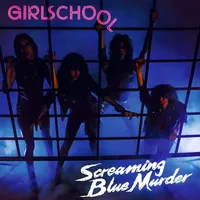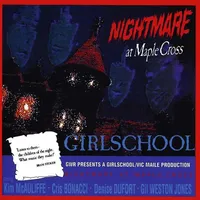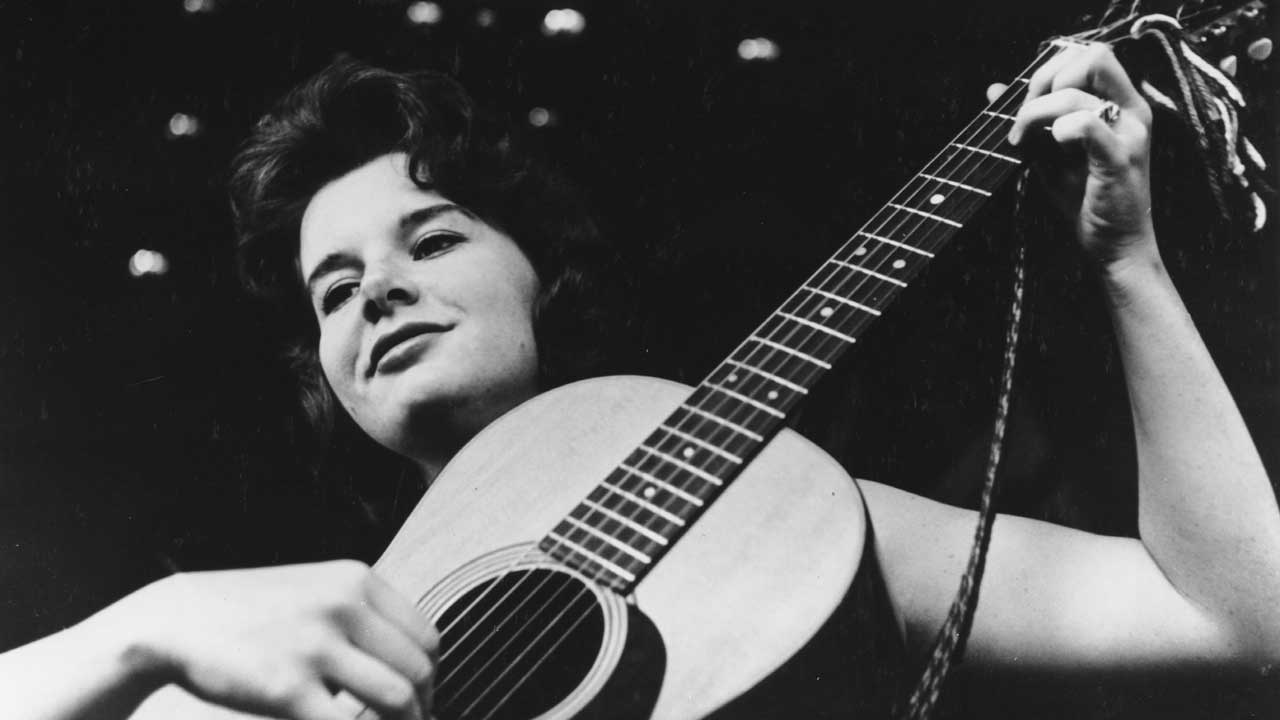The Girlschool albums you should definitely own
Celebrated as ‘the female Motörhead’, Girlschool became stars of the NWOBHM scene. But what were their best albums?

Select the newsletters you’d like to receive. Then, add your email to sign up.
You are now subscribed
Your newsletter sign-up was successful
Want to add more newsletters?

Every Friday
Louder
Louder’s weekly newsletter is jam-packed with the team’s personal highlights from the last seven days, including features, breaking news, reviews and tons of juicy exclusives from the world of alternative music.

Every Friday
Classic Rock
The Classic Rock newsletter is an essential read for the discerning rock fan. Every week we bring you the news, reviews and the very best features and interviews from our extensive archive. Written by rock fans for rock fans.

Every Friday
Metal Hammer
For the last four decades Metal Hammer has been the world’s greatest metal magazine. Created by metalheads for metalheads, ‘Hammer takes you behind the scenes, closer to the action, and nearer to the bands that you love the most.

Every Friday
Prog
The Prog newsletter brings you the very best of Prog Magazine and our website, every Friday. We'll deliver you the very latest news from the Prog universe, informative features and archive material from Prog’s impressive vault.
It was Kim McAuliffe, rhythm guitarist, lead vocalist and founder of Girlschool, who defined the group most succinctly. “Deep down, we’re a rock’n’roll band,” she said. “Like Motörhead. Heavy metal rock’n’roll, we call it.” And nobody understood that better than Motörhead leader Lemmy, an influential ally in Girlschool’s rise to fame in the early 80s.
For an all-female band operating in the male-dominated arena of heavy rock, sexist bullshit was commonplace. Gerry Bron, who had Motörhead and Hawkwind on his label Bronze Records, said of his decision to sign Girlschool: “I went to an early rehearsal and was surprised how well they played their instruments. How terribly chauvinistic of me.”
But Lemmy was better than that. When Girlschool opened for Motörhead on a 1979 tour, he stated authoritatively: “They’re fucking great.” He was outspoken in his support of this and other female bands: “People treat them like second-class citizens, because they’re chicks,” he said. “It’s really poor.”
And the close relationship between Motörhead and Girlschool was cemented in 1981 with the St. Valentine’s Day Massacre E.P. – released under the hybrid name of Headgirl, with the two bands united on a blistering version of Johnny Kidd & The Pirates’ Please Don’t Touch.
McAuliffe is the sole constant in Girlschool’s long history, having formed the band in London in 1975 as Painted Lady. The classic line-up came together in 1978: McAuliffe and bassist/vocalist Enid Williams were joined by lead guitarist Kelly Johnson and drummer Denise Dufort. They took the name Girlschool from the B-side of Paul McCartney And Wings’ hit Mull Of Kintyre.
The debut album Demolition, released in 1980, established Girlschool as rising stars of the New Wave Of British Heavy Metal, and while their success was brief and modest compared to that of Iron Maiden and Def Leppard, the tenacity of McAuliffe has seen the band through lean years and numerous personnel changes.
The tragedy in Girlschool’s story is the loss of Kelly Johnson, who quit in 1984, returned in 1993, but withdrew again in 1999 after being diagnosed with cancer. She died in 2007 at the age of 49. Girlschool will always perform those great songs they recorded with Kelly in the 80s, but as Kim McAuliffe said: “Kelly was great, and we miss her a lot.”
Girlschool's 13th album 45WTFortyfive? is released on July 28.

Girlschool’s first album had all the destructive force its title implied, and it arrived at the perfect time. In 1980, as the NWOBHM hit its peak, Demolition matched Iron Maiden’s debut and Saxon’s Wheels Of Steel for raw energy, and its dirty, streetwise “heavy metal rock‘n’roll” had Girlschool acclaimed as ‘the female Motörhead’.
Across the album’s ten rowdy tracks, the highlights included Motör-powered head-bangers such as Demolition Boys and Emergency, and a rollicking version of The Gun’s 1968 hit Race With The Devil. Girlschool had delivered a great album – and to sneering sexists, a kick in the balls.
It was inevitable that Girlschool would be compared to the most famous all-female rock’n’roll band of the 70s, The Runaways. And in the year that ex-Runaway Joan Jett’s hit album I Love Rock ’N Roll was released, Girlschool had their greatest success – the Headgirl EP. and their second album, Hit And Run, both reaching No.5 in the UK before the band headlined at the Reading Festival.
The album had a flavour of The Runaways’ punk/glam rock in C’mon Let’s Go; a moment of comedy in Yeah Right, with Enid mimicking her nagging mum; a boisterous, role-reversing cover of ZZ Top’s womanising anthem Tush; and best of all, a title track full of swagger.
Screaming Blue Murder (Bronze, 1982)
On the third album there was a new face in the band, with Gil Weston replacing Enid Williams on bass, and a change of producer from Vic Maile to Nigel Gray. But if Gray seemed an odd choice for Girlschool – his previous clients included The Police – Screaming Blue Murder hit as hard as the two albums the band made with Maile.
The title track had an urgent momentum and killer lead guitar from Kelly. There was much piss and vinegar in Take It From Me, reminiscent of Aerosmith’s Draw The Line; cockiness in a cover of the Stones’ Live With Me; and a touch of pop genius in Don’t Call It Love.
It was a bold move that didn’t pay off; a slick-sounding album that alienated many fans and derailed the band’s career. But for Denise Dufort, Play Dirty is their best record. And its title track is their greatest anthem.
The girls’ love of 70s glam rock was writ large on an album produced by Jim Lea and Noddy Holder of Slade, and featuring covers of two minor Slade songs plus a noisy rendition of the T.Rex classic 20th Century Boy. But the production was very 80s, and while that worked brilliantly on the Def Leppard-inspired Going Under and that super-sized title track, the album still tanked. Worst of all, it led to Kelly Johnson’s departure.
According to Cris Bonacci, the guitarist who replaced Kelly Johnson in Girlschool in 1984, this eighth album had a working title combining feminism and rock’n’roll attitude in two words: ‘No Bollocks’. Instead, the music became a statement in itself.
In 1992, as grunge gave rise to a new generation of women in rock, Girlschool delivered one of their heaviest albums. There was nothing ‘alternative’ about it – just rock, as the girls ripped it up on My Ambition and attempted to out-Motörhead Motörhead on the cataclysmic Can’t Do That. It was Bonacci’s last album with the band, and she went out on a high.
21st Anniversary: Not That Innocent (Communiqué, 2002)
Due to lengthy delays, this album was actually released on the 22nd anniversary of the band’s debut. Even so, it has great significance and poignancy, as Kelly Johnson’s swansong. Johnson retired from the band during the making of the album, as did Tracey Lamb, who served stints as bassist in the 80s and 90s.
While recording was eventually completed with Enid Williams returning on bass and Jackie Chambers on lead guitar, the standout tracks are those Johnson left behind: Mad Mad Sister and Knife, two powerful modern rock songs, and A Love Too Far, a beautiful ballad.
Nightmare At Maple Cross (GWR, 1986)
After two albums of polished mainstream rock, Play Dirty and Running Wild, Girlschool got back to basics with Nightmare At Maple Cross. McAuliffe handled all lead vocals following the exit of Jackie Bodimead, singer on Running Wild, and Vic Maile returned as producer for an album as raw as their first.
This no-frills approach yielded wonderfully loud and snotty tunes like All Day, All Night and Back For More. And while another glam rock cover, of Mud’s Tiger Feet, was lame, it was less regrettable than the one chosen for the US release – a duet with Gary Glitter on his signature song I’m The Leader Of The Gang (I Am).
As its title implied, Legacy was an album loaded with meaning. A celebration of the band’s 30th anniversary, it featured guest stars including Tony Iommi, Ronnie James Dio and members of Motörhead past and present. Most importantly, its title track was an epitaph for Kelly Johnson.
The girls had a blast with their famous friends: Lemmy and Kim singing a raucous duet on Don’t Talk To Me, ex-Motörhead guitarist ‘Fast’ Eddie Clarke blazing away on a version of the ’Head classic Metropolis, Dio and Iommi adding a little black magic to I Spy. Even the song for Kelly was upbeat – written by Jackie Chambers, but filled with her bandmates’ warm memories
The band’s recent line-ups have not been prolific, making only six original studio albums in three decades – including the upcoming WTFortyfive?. But in all of those albums, much ass has been kicked. Before Legacy there was 2004’s Believe, its positive energy typified by We All Love To (Rock ‘N’ Roll), an anthem worthy of Joan Jett.
Most recently there was Guilty As Sin, in which the longest running female rock band of all time proved there was still plenty of gas in the tank. The album’s best track, Take It Like A Band, was reassuringly familiar, another hard and fast homage to Motörhead. The only weak spot was a heavy-handed cover of the Bee Gees’ disco floor-filler Stayin’ Alive.
...and one to avoid
You can trust Louder
Girlschool made only one album as a five-piece, and it was, as Kim McAuliffe later admitted, “rubbish”. After Kelly Johnson quit, McAuliffe recruited lead guitarist Cris Bonacci and singer Jackie Bodimead. But the remodeled Girlschool, with a glammed-up image and Americanised sound, failed miserably.
Aimed squarely at the US market, Running Wild was equal parts empty-headed hair metal and soft-focus AOR. Its cliché-ridden songs reeked of desperation, as did a lousy cover of Kiss’s Do You Love Me? The album stiffed in the US and wasn’t even released in the UK. It would take years of graft for their credibility to be restored.
Sign up below to get the latest from Classic Rock, plus exclusive special offers, direct to your inbox!
Freelance writer for Classic Rock since 2005, Paul Elliott has worked for leading music titles since 1985, including Sounds, Kerrang!, MOJO and Q. He is the author of several books including the first biography of Guns N’ Roses and the autobiography of bodyguard-to-the-stars Danny Francis. He has written liner notes for classic album reissues by artists such as Def Leppard, Thin Lizzy and Kiss, and currently works as content editor for Total Guitar. He lives in Bath - of which David Coverdale recently said: “How very Roman of you!”











